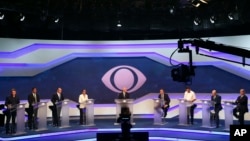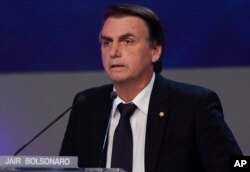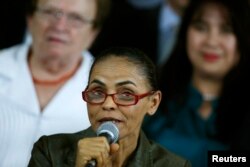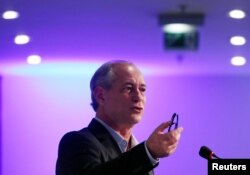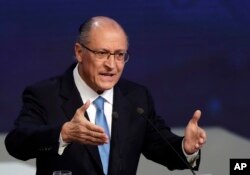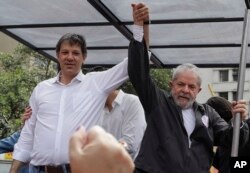With poll-leading former President Luiz Inacio Lula da Silva in jail and likely to be barred from running, Brazil's presidential election is wide open. A look at the five contenders with the best chances, according to polls.
Jair Bolsonaro
The former army captain and seven-term congressman has tapped into deep unease in Brazil, which is reeling from a sweeping corruption scandal and is struggling to grow again after a protracted recession. Bolsonaro has expressed nostalgia for the 1964-1985 military dictatorship, has been repeatedly fined for offensive comments, and has made cracking down on crime a centerpiece of his campaign. He says he supports market-friendly economic policies but has given few details.
After da Silva, he garners the most support, between 18 to 20 percent in an Ibope poll released Monday. But Bolsonaro is backed by a small party that will get only a small share of the free TV air time allocated by law for campaigns. He will also have to overcome high disapproval ratings.
The poll, which has margin of error was 2 percentage points, interviewed 2,002 people between Aug. 17 and 19.
Marina Silva
When da Silva's name is removed from polls, one of the main beneficiaries is Marina Silva: Her support jumps from 6 percent to 12 percent in the Ibope poll. Silva, who once served as da Silva's environment minister, has a dramatic personal story: She suffered numerous illnesses and often went hungry as a child. She didn't learn to read and write until her teens. Silva nearly upended the last presidential race when her party's candidate died during the campaign and she took his place. She initially surged in polls, tapping into voter discontent and attracting Brazilians on both the left and right.
Back then and to this day, however, Silva has struggled to define herself, beyond her focus on environmental issues.
Ciro Gomes
The left-leaning Gomes, who has roots in da Silva's stronghold of the northeast, is another beneficiary when the former president is removed from polls. Gomes has extensive experience, having served as governor, mayor, minister and federal congressman, and would be prepared to navigate the halls of power in Brasilia from Day 1. He appeals to voters who are disgusted with dirty dealings so common in Brazilian politics, touting the fact that has remained clean, despite decades in public service.
Still, Gomes has struggled to unite the left — he attracted between 5 and 9 percent support in the Ibope poll — and he has a reputation for being prickly and saying controversial things.
Geraldo Alckmin
A three-time governor of Sao Paulo, Brazil's largest and richest state, Alckmin has a lot of executive experience. At a time when deteriorating public security is of growing concern to many voters, Alckmin can run on the city of Sao Paulo's remarkable reduction in its murder rate. He is a conservative who supports market-friendly economic policies, like scaling back the country's faltering social security system, making him the darling of investors.
But Alckmin lacks charisma and his poll numbers have been in the single digits. He also has high disapproval ratings. However, Alckmin will get significant funding and free TV time because of the size of his Brazilian Social Democracy Party and alliances he has made.
Workers' Party Substitution
Da Silva and his Workers' Party have insisted he is running, but most in Brazil expect him to eventually be barred from the race because of his conviction. The party has chosen former Sao Paulo Mayor Fernando Haddad as its vice presidential candidate, and it looks likely he will assume the top spot if the Supreme Electoral Court rejects da Silva's candidacy.
In the Ibope poll, Haddad garnered only 4 percent support when he replaced da Silva. But two-thirds of da Silva's supporters have indicated they would vote for whomever he eventually endorses. The question is if that endorsement might come too late in the campaign to give Haddad's numbers a chance to rise.




